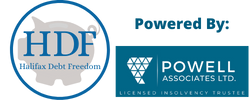5 Ways To Avoid Bankruptcy

When facing debt challenges, many look to avoid bankruptcy. This is completely understandable. Bankruptcy can be emotionally devastating, and unfortunately, with approximately 1 in 4 Canadians filing for bankruptcy a second time, this only worsens. It is because of this that we believe bankruptcy should be used as a last resort.
For this reason, we recommend consumers try and avoid bankruptcy unless it is the absolute best option. So, how do you know if you should be filing for bankruptcy? Well, it is quite easy – we recommend you explore all five of the options listed below. Then, if none of them work or are effective, you can confidently say bankruptcy is your best choice.
The 5 ways to avoid filing for bankruptcy
- Getting through your debts on your own. You can try things such as:
- Getting a second job, or a side hustle, or
- Reducing your expenses. The most common ones are eating out, groceries, and cell phone/internet bills.
- A debt consolidation loan can be an effective option if you have good credit and can comfortably afford the new monthly payment. If you have considerable equity in your house, you can also consider refinancing your mortgage or getting a second mortgage. We do caution against this option, though. While it can reduce high-interest debt payments, such as credit card debt, you are converting unsecured debt to secured debt, which can be dangerous.
- If your debts are older, you are behind on payments, and you have access to a lump sum of money, debt settlement may be an option. Debt settlement is where you offer to pay less than the full amount as a lump-sum payment to your creditor. Usually, the longer the debt has been behind on payments, the more they may be willing to accept a settlement offer.
- The problem with debt settlement is that it requires a lump sum of money to be effective. If you do not have access to this type of lump sum and can only afford a monthly payment plan, then you have a final two options to consider:
- A debt management plan: This option is offered through a credit counseling company. They will contact your creditors and develop a plan that usually involves paying back 100% of the principle without any interest. A fee is charged, which usually ranges between 5-15% of the overall debt loan. Usually, the monthly payment in a debt management plan is roughly equal to what a debt consolidation loan would be. Because of this, if a debt consolidation loan was already unaffordable, then a credit counseling program will usually be unaffordable as well.
- A consumer proposal can also be an effective option to avoid bankruptcy. In fact, it is an alternative to bankruptcy governed by the same law bankruptcy is governed by. A consumer proposal is a legal process whereby a consumer typically offers their creditors more than they would get in bankruptcy but less than the consumer owes. A consumer proposal also eliminates any interest rate that would be payable on the debt.
If you have explored all of these options to avoid bankruptcy and can not make any of these work, you can confidently look at filing a bankruptcy knowing you reviewed everything.
Can I avoid bankruptcy with a debt consolidation loan?
Yes. If you have good enough credit, you can absolutely avoid bankruptcy by obtaining a loan to pay off any of the debts troubling you. Just make sure you can comfortably afford the payment.
Why is it best to avoid filing for bankruptcy?
It is usually best to avoid bankruptcy because of the negative consequences of bankruptcy. The first bankruptcy will stay on your credit report for a period of 6 years following the date of discharge. This is usually for a total of approximately 7 to 8 years. A second-time filing stays on your credit report for a period of 14 years past the date of discharge. It is mainly because of this fact that bankruptcy should be used as a last resort option.
Bankruptcy should also be avoided as most types of debt that can be discharged in this process can be dealt with via other options such as a debt consolidation loan or consumer proposal.
As covered in our consumer proposal vs bankruptcy guide, a bankruptcy often has a much higher payment than other debt programs. This is because a bankruptcy payment is based on how much money you make monthly, your family size, and your assets. It isn’t based on how much you are able to pay at all.
How can I get out of debt without filing bankruptcy?
To get out of debt without filing bankruptcy, you can explore the options listed above. Most consumers are very aware of debt settlement & debt management plans, but many aren’t aware of the other options. Therefore, we recommend checking them out above.
How do I protect myself from bankruptcy?
There are many ways to protect yourself from bankruptcy. The first thing you should do is be very wary of credit card debt and the interest rate associated with them. Credit cards aren’t the only debt that causes people to be pushed over the edge, but they are usually a catalyst in how quickly debt starts to add up.
It isn’t uncommon for us to see credit card debt that increases very quickly when people do not keep these in check. Therefore, we recommend you limit your credit cards to a single card and obtain a low interest rate card.
We also recommend you do not co-sign on any credit products for anyone. The majority of the time, what pushes people to file bankruptcy is unplanned and largely unpreventable. So to minimize your risk by not co-signing anything.
But the biggest piece of advice by far is to establish an emergency fund. The goal is to eventually save up to 3-6 months of your bare-bones living expenses. This does take a while, but you will have a much better financial foundation built for yourself, your money, and your overall risk once you achieve it.
What can you do to prevent your own personal bankruptcy?
To prevent your own personal insolvency filing, you should limit the amount of credit that you extend to yourself. It is very easy to spend money. At the same time, we all have every intention to pay back what we borrowed; life truly does get in the way. Limiting the amount of credit you have access to is the best financial line of defence you can have to protect yourself.
This article was written by David Moffatt, a Debt Relief Expert. He has helped assist in creating plans that have helped save Nova Scotia residents over $30 million dollars of consumer and tax debt since 2015. We believe that no consumer should have to struggle with the stress of overwhelming debt. Our debt restructuring strategies can help you cut your debt by up to 80%.
If you are struggling with debt please reach out. It hurts to continue to suffer financially. Halifax Debt Freedom services Halifax, Dartmouth, Bedford, Sackville the entirety of HRM, and all of Nova Scotia.

